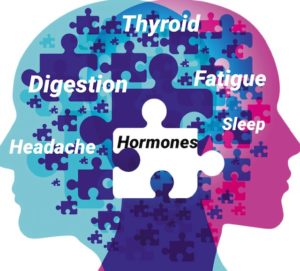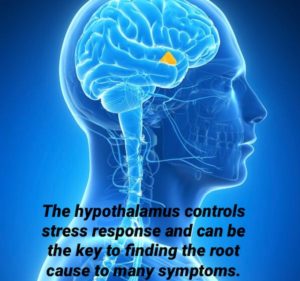Do you have symptoms of poor digestion, weight gain, skin issues, hormone imbalances, emotional instability, sleep deprivation, headaches, or fatigue? These are examples of a variety of symptoms and include different systems of the body. Is it possible that in many cases, there could be one underlying cause to poor body function?
Tests can be performed to find a cause for digestive upset. A doctor can make a diagnosis such as leaky gut, digestive enzyme deficiencies, inflammation, and more. The thyroid can be tested to determine the cause for low sex drive, fatigue, hair loss, skin issues, anxiety, and hormonal imbalance.
Let’s say, for example, that the tests show a leaky gut or a hormone imbalance. Have we determined the root of the problem or are we just treating the symptoms? What is the control center for these system functions? In order to consider these evaluations with a functional approach, one must take a look at the “control mechanism” and evaluate the root cause of the symptoms.
The part of the brain that regulates and controls the thyroid, digestion, hormone balance, and the reproductive organ function is the hypothalamus. Think of it as the “upward” center that controls these “downward” body functions. When a body system faces external or internal changes in the environment, the hypothalamus recognizes the changes and makes the necessary adjustments. Changes in light or temperature, danger, loss, or emotions can initiate changes prompted by the hypothalamus in the autonomic nervous system and the endocrine system.
One example of this would be the secretion of cortisol from the adrenal gland when faced with danger or a perceived threat. This greatly effects the endocrine system and interferes with hormone output. This can greatly affect the digestive system and over time causing damage to the gut.
Because the brain controls our involuntary functions, it is believed that the hypothalamus is the source to managing most chronic conditions.
A salivary hormone test that measures cortisol awakening response is one suggestion to test the hypothalamus function. Think of it as a “stress test for the brain.” When there are normal levels, we see a healthy stress response. When overactive, we may have an exaggerated reaction to stress. This can be a result of a past trauma and can cause overall poor health and sleep dysfunction. When the function is flattened, we see the depletion of neurotransmitters in the hypothalamus such as glutamate, dopamine, and norepinephrine. Glutamate is a chemical that nerve cells use to send signals to other cells. It is the most abundant neurotransmitter in the nervous system. Dopamine is important for function, motor control, motivation, reward, arousal, and reinforcement. Norepinephrine increases heart rate along with adreneline. It increases blood pressure and pumps blood to break down fat and increase blood sugar, providing energy for the body. These all have important roles within the body, and when they are depleted, it causes our stress response to be disorganized and dysfunctional.
The cortisol awakening response is an excellent starting point to determine the root cause for many symptoms. Further tests can be administered to access the effects of stress on specific systems of the body, such as adrenal response, thyroid function, digestive system, and reproductive organ function. System function testing alone does not give us the full picture. The hypothalamus function must be considered and the possible affects that stress can have on the body to get a full assessment and a solid plan for recovery.



